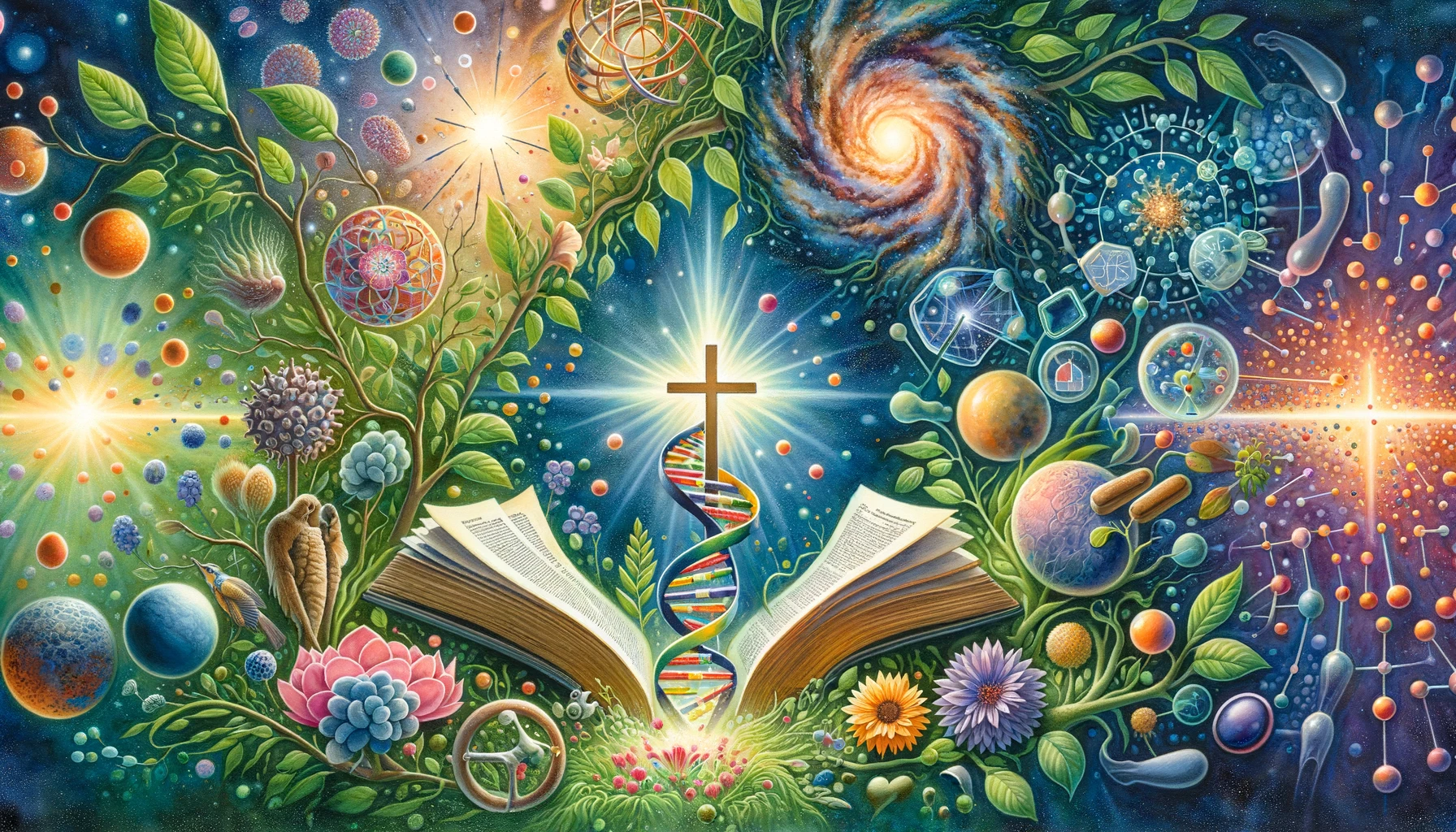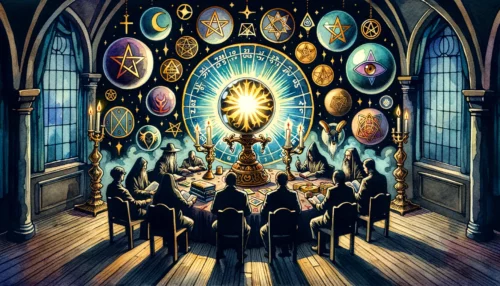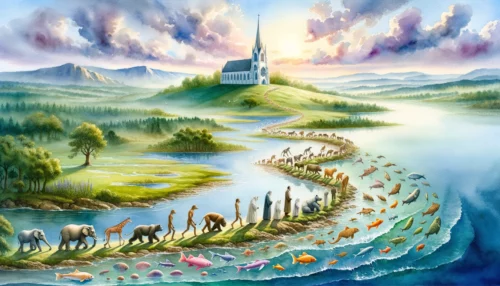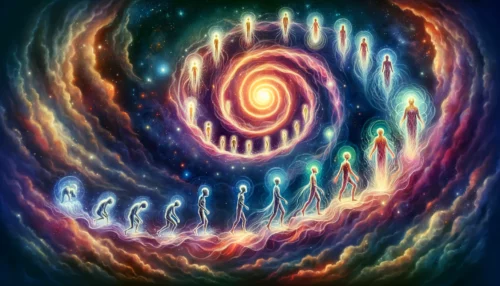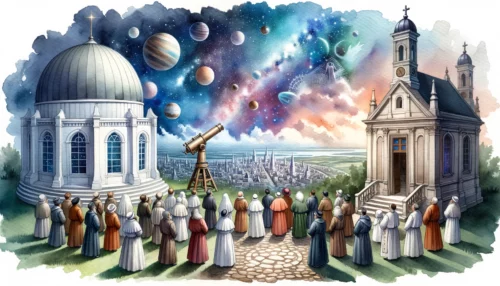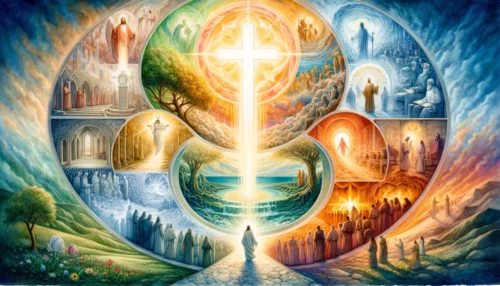The debate around creationism and science is as old as the concept of science itself. At the heart of this discussion lies a fundamental question: Can the biblical account of creation be reconciled with the scientific method and empirical evidence? This question does not merely seek to validate or refute creationism on scientific grounds but also to understand how these seemingly disparate domains—faith and science—interact, intersect, and influence our perception of the world. In attempting to answer this, we must consider not only the scientific credentials of creationism but also how its acceptance or rejection shapes our understanding of science, religion, and their roles in society. What does it mean for something to be scientifically valid? And how does the interpretation of ancient scriptures fit into the modern scientific paradigm?
The Foundations of Creationism and Scientific Inquiry
Creationism, as derived from the biblical narrative, presents the universe, earth, and all life within as the intentional creations of God. This belief is rooted in the Genesis account, where the creation of the world and everything in it occurs over six days, with God resting on the seventh (Genesis 1-2). The essence of creationism lies in the conviction that every aspect of existence stems from a deliberate act of divine will, contrasting with scientific theories that suggest natural processes like evolution and the Big Bang.
The biblical narrative asserts the creation of light, the separation of water from the sky, the gathering of waters to reveal land, and the creation of plants, celestial bodies, animals, and finally, humans, as distinct acts by God. Each step is an affirmation of God’s sovereignty and power, illustrating a universe created with purpose and order. Within Christianity, this account underscores the belief in a God who is both immanent and transcendent, deeply involved in the workings of the world while also existing beyond it.
Christianity asserts that human beings are created in the image of God (Genesis 1:27), imbuing human life with inherent value and purpose. This belief fundamentally shapes the Christian understanding of human dignity, morality, and purpose. The creation narrative also establishes the concept of stewardship, where humans are entrusted with the care of the earth and its creatures, reflecting God’s own care and creativity.
The reconciliation of creationism with scientific inquiry often involves examining the nature of divine action and the interpretation of scriptural texts. While creationism stands on the premise of divine intervention, it also engages with the natural world in ways that invite reflection on the relationship between faith and reason. The belief in a creator does not inherently dismiss scientific discovery; rather, it can inspire a sense of wonder and a desire to explore the world as a manifestation of God’s design.
The dialogue between creationism and science is not merely about contesting facts but about understanding the ways in which the world can be interpreted. It challenges Christians to consider how God’s methods of creation and the timelines presented in the Bible can be understood in the context of geological and cosmological evidence. This does not diminish the truth of the biblical account but encourages a deeper engagement with the text and the world.
Christians hold that the Bible offers not just a historical or scientific account but a theological one, revealing God’s character, purposes, and interactions with humanity. The biblical creation narrative, therefore, is seen not only as a description of how the world came to be but as an introduction to the nature of God and His relationship to creation.
The foundation of creationism is built on the belief in a purposeful creation by a sovereign God, as detailed in the Genesis account. This perspective shapes the Christian understanding of the world, human life, and our relationship with the Creator. While creationism and scientific inquiry approach the origins of the universe from different standpoints, they both contribute to the ongoing exploration of existence. The interaction between faith and science in this context does not necessitate conflict but rather invites a deeper investigation into the mysteries of creation and the nature of divine action.
Interpreting the Bible in the Light of Modern Science
The task of interpreting the Bible in the context of modern science engages Christians in a thoughtful exploration of how ancient scripture speaks to contemporary understandings of the universe. This process involves discerning the genre, context, and purpose of biblical texts, recognizing that the Bible communicates truth through historical narratives, poetry, prophecy, and apocalyptic literature, among other genres. The Genesis creation accounts, for example, are rich in symbolic language and theological truth, conveying messages about God’s sovereignty, creativity, and relationship with creation rather than providing a scientific textbook explanation of the origins of the universe (Genesis 1-2).
Christians believe the Bible was inspired by God and written by human authors within their historical and cultural contexts. This dual authorship means that while the Bible is authoritative in matters of faith and practice, its descriptions of natural phenomena are expressed in the language and concepts of the time. Thus, the days of creation can be understood as a literary framework to describe the orderly and purposeful nature of God’s work rather than as a literal 24-hour period (Genesis 1).
Science, in its quest to understand the natural world, offers detailed explanations of how the universe operates, from the laws of physics to the processes of evolution and the Big Bang. These scientific insights do not diminish the theological truths of creation but enrich our understanding of the complexity and majesty of the world God has made. The Christian faith embraces the pursuit of knowledge and wisdom, seeing the study of science as a means to marvel at God’s handiwork and to steward the earth responsibly (Psalms 111:2).
The dialogue between faith and science is framed by humility, recognizing that both realms seek to explore different dimensions of truth. Science asks how the world functions and seeks to uncover the mechanisms behind its operations. Faith, on the other hand, seeks to understand why the world exists and what it means to live within it according to God’s purposes. The biblical account of creation provides the foundation for these existential and moral inquiries, guiding believers in their relationship with God, with each other, and with the environment (Genesis 1:28).
In interpreting the Bible in light of modern science, Christians are called to engage critically and constructively with both realms of knowledge. This approach does not require the rejection of scientific discoveries that appear to challenge traditional readings of Scripture but encourages a re-examination of how these readings might coexist with or even be illuminated by scientific understanding. Through this process, Christians affirm their faith in a Creator who is the source of both the orderliness and the wonder of the cosmos.
Interpreting the Bible in the context of modern science is an exercise in understanding the depth and breadth of divine revelation through scripture and the natural world. This approach acknowledges the Bible’s theological intentions and embraces scientific discoveries as a means to appreciate the intricacy of God’s creation. Engaging with both the Word of God and the works of God enables Christians to deepen their faith, enrich their understanding of the universe, and live out their calling to stewardship and worship.
The Impact of Creationism on Scientific Discourse and Religious Belief
The intersection of creationism with scientific discourse and religious belief invites a multifaceted exploration of how these domains influence each other. Within the Christian faith, the doctrine of creation forms a cornerstone that informs not only theological perspectives but also ethical, environmental, and philosophical stances. It underscores a worldview that sees the universe as a coherent, purpose-driven creation of God, challenging both the Christian community and the broader scientific world to consider the implications of such a belief system on their work and understanding of reality.
The impact of creationism on scientific discourse manifests in the ongoing dialogue between faith and science. This relationship is not inherently antagonistic but is characterized by a dynamic tension that can foster deeper inquiries and innovations. Christians engaged in scientific fields often approach their work with a sense of wonder and reverence for the order and complexity of the universe, reflecting the belief in a divine Creator. This perspective can lead to ethical considerations in scientific research, emphasizing stewardship, sustainability, and the moral implications of scientific advancements (Genesis 2:15).
In the realm of religious belief, creationism reinforces the foundational Christian conviction of a personal, relational God who is actively involved in His creation. This belief shapes the Christian understanding of human identity, purpose, and destiny, offering a counter-narrative to views that see human existence as the product of random processes. The creation narrative emphasizes human beings’ unique status as bearers of the divine image, tasked with caring for the earth and living in harmony with its creatures (Genesis 1:26-28).
Moreover, the discussion around creationism and evolution provides an opportunity for Christians to engage with Scripture critically and thoughtfully. It encourages believers to grapple with questions of interpretation, the nature of divine revelation, and the integration of faith with empirical evidence. This process can strengthen faith, as it requires an open, honest exploration of both the Bible and the natural world, acknowledging God’s revelation in both.
The dialogue between creationism and scientific discourse also has implications for education, public policy, and cultural conversations around science and religion. It challenges educators, policymakers, and religious leaders to navigate these discussions with sensitivity, respect, and an openness to diverse perspectives. By fostering an environment where questions of origin, meaning, and purpose are explored in a context that values both faith and reason, society can benefit from a richer, more nuanced understanding of the world.
The engagement of creationism with scientific discourse and religious belief encourages a comprehensive examination of the universe from both scientific and theological perspectives. It highlights the beauty and complexity of creation, affirming the Christian view of a purposeful universe under the sovereignty of a divine Creator. This interaction enriches the Christian faith, promotes ethical reflection in scientific practice, and invites meaningful dialogue between diverse viewpoints, fostering a deeper appreciation for the wonder of creation and the pursuit of truth.
Uniting Faith and Reason
The conversation between creationism and science enriches our understanding of the world through the lens of Christian faith. This dialogue invites believers to appreciate the magnificence of God’s creation while engaging critically with scientific discoveries. It fosters a worldview that integrates faith with empirical knowledge, encouraging Christians to see God’s handiwork in the intricacies of the universe and to respond with awe, stewardship, and ethical responsibility.
Key takeaways:
- The biblical account of creation provides a foundational perspective for Christians, emphasizing a purposeful universe created by a sovereign God.
- Interpreting the Bible in the light of modern science encourages a deeper exploration of faith and reason, enriching the Christian understanding of God’s world.
- The interaction between creationism and scientific discourse offers opportunities for ethical reflection, dialogue, and a harmonious integration of religious belief with scientific inquiry.
Further Reflections:
- How can Christians contribute to the dialogue between faith and science in a way that respects both perspectives?
- What role does the belief in a Creator play in shaping our understanding of human dignity and responsibility towards the environment?
- In what ways can the integration of scientific discoveries with biblical teachings enhance our worship and awe of God?
Let the marvels of creation and the wonders of science draw you closer to the Creator, inspiring a faith that seeks understanding and a heart that responds in worship. May this journey deepen your appreciation for the vastness of God’s work and the boundless scope of His wisdom, guiding you to live with purpose and reverence in the world He has made.




